Nigerian Cornish pasty is a wholesome hand pie filled with meat and vegetables. The few times I have bought Cornish Pasty in Nigeria, have been underwhelming. More like a meat pie with a different name, so I now make my own.
I love Cornish pasty not just because it’s awesome but it is full of history and I love anything with history and culture. To learn about the history and regulations of Cornish pasty visit http://www.cornishpastyassociation.co.uk/about-the-pasty/. Cornish Pasty has been called cousin Jack’s mouth organ, just like the Nigerian mouth organ AKA roasted corn on the cob.
Since this recipe does not follow the guidelines of the C.P.A, I choose to call it Nigerian Cornish Pasty. Be flexible and create awesome pasties that suit your palate.
Normally, I like a moderately sized meat pie, fish pie or cocktail sized sausage rolls, but when it comes to Cornish pasty, I like it hefty, big hefty pies. I see Cornish pasty as a meal and, not a snack, therefore, it should be big enough to fill me up.
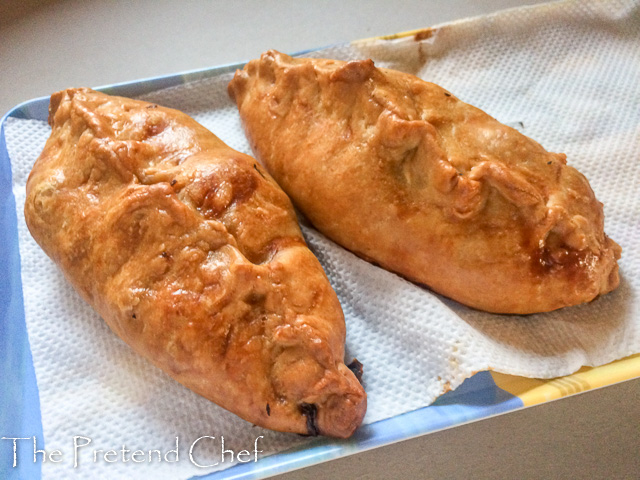
Cornish pasty though similar to the Nigerian meat pie is different in that it is filled with raw meat and vegetables, while meat pie is filled with meat and vegetables that have been cooked into a gravy. So for the pasty, the magic of the gravy happens right inside the crust casing.
Pasties have been known to contain, bacon, pork, egg, rabbit, chicken, mackerel, peas even sweet fillings like dates, figs, apples, jam, chocolate, banana, sweetened rice. There is also the vegetarian cornish pasty.
About the ingredients for the Nigerian Cornish Pasty
With the long cooking, cheap cuts of meat can be used for Cornish pasty. The cut of beef used for the traditional Cornish pasty is the skirt steak, it is tough but very flavourful and has a moderate amount of fat on it. Some fat is necessary to keep the meat moist and the gravy rich. I use Tozo meat, which is the hump of the Zebu cattle in Nigeria. Tozo is that cut of meat your doctor warned you not to eat, it is a highly marbled piece of meat. When cooked properly, it is rich and sweet and makes you happy, it doesn’t disintegrate with prolonged cooking. Tozo will make your pasty stand out.
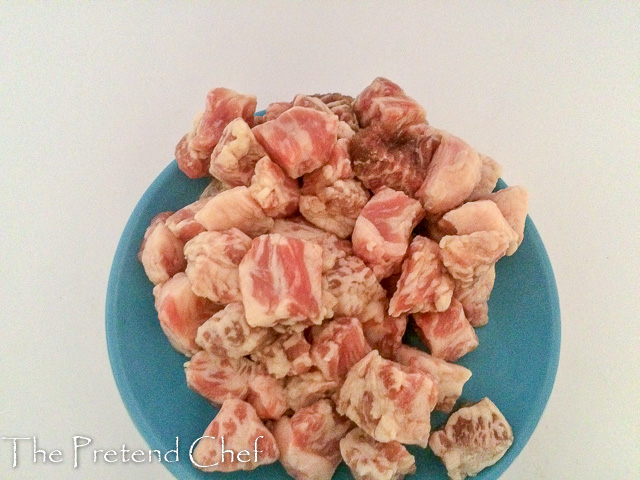
The vegetables for the traditional Cornish pasty made in Cornwall are potato, onions and swede seasoned with only salt and pepper. The use of carrot is regarded as sacrilege but being that this is Nigerian Cornish pasty and swede though sold in Nigeria is extremely uncommon so I use carrots all the time. I plan on making my next batch with daikon (white radish, Chinese radish) which I buy from my local greengrocers from time to time.
Chop the meat and vegetables about the same size, this is to ensure everything cooks evenly well and all at the same time inside. With slow cooking, you will end up with a rich, flavoursome and succulent filling.
The crust acts both as an insulator and a pocket for the meat and vegetables. History has it that in the 19th century, it was made for tin miners’ lunch in the region of Cornwall, England. So the crust needs to be sturdy, strong and not crack while filling, cooking or resting. Mostly, the short-crust pastry is used, there is a slight difference from my Easy Pie Dough, Shortcrust Pastry. To achieve strength, you need to knead this dough very well to develop gluten and toughen the crust unlike other pastries like Vegetable pie, apple pie etc. Flaky and puff pastries can also be used.
To make the Nigerian Cornish Pasty
Dough 2 cups flour 1/2 teaspoon salt 1/3 cup margarine 1/2 cup + 3 tablespoons ice cold water
Filling 250g Beef, cut into cubes 250g potato, diced 125g carrot, diced 50g onions, diced or sliced 75g leek, sliced salt Pepper Egg or milk for glazing.
Place flour in a large bowl, add salt and mix.
Cut cold margarine into the flour.
Rub in the margarine with your fingers, fork, knife or pastry cutter, until the mixture resembles large breadcrumbs.
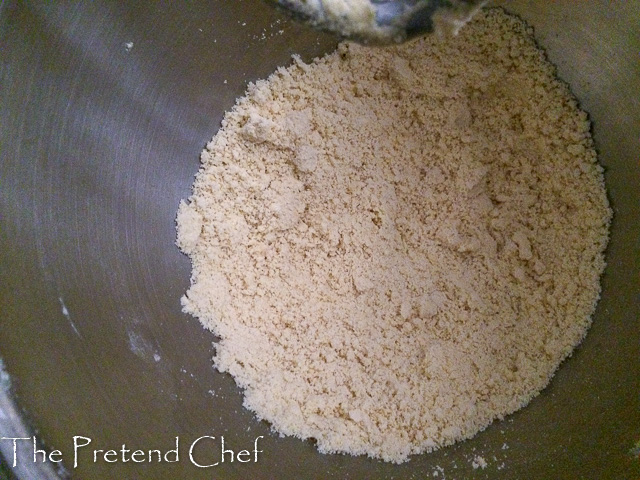
Add 1 cup cold water and knead, adding the rest of the water as needed.
Knead to form a soft, smooth, pliable and elastic dough. A food mixer can also be used.
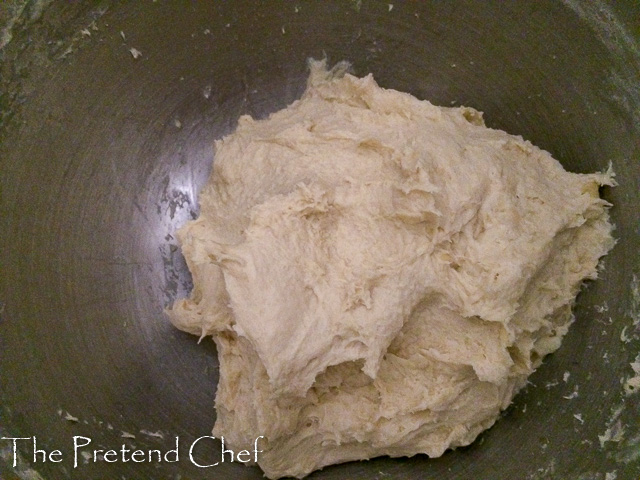
Flatten dough to form a disc and put in a plastic wrap, this helps it chill faster.
Put in the refrigerator to chill and relax for three hours or more.
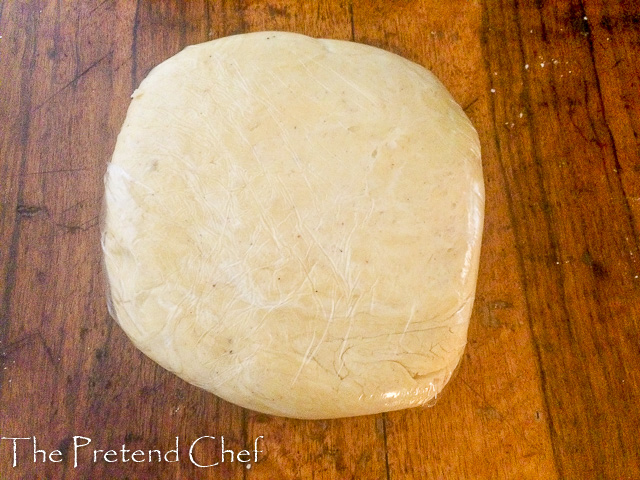
Allow dough to warm up a bit before rolling.
If frozen, defrost in the refrigerator possibly overnight.
Meanwhile, prepare the pasty filling and set aside.
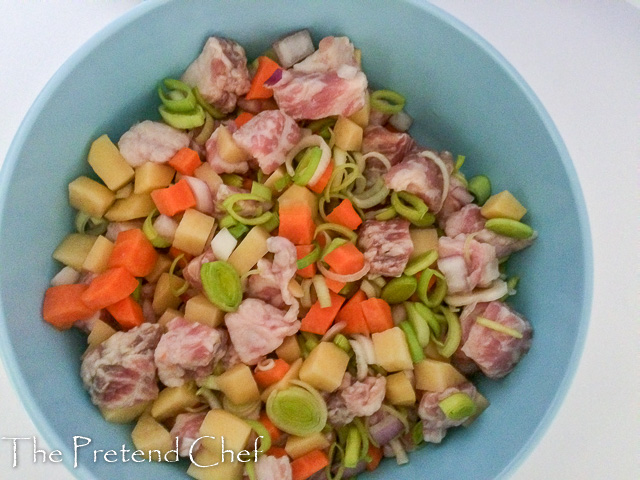
To roll dough
Press dough lightly with the rolling pin at the centre and roll outwards.
Roll in one direction a couple of times then lift it up and rotate a quarter turn and roll. Keep rolling and rotating till you get your desired thickness.
Be patient and take your time.
If the dough is getting sticky, lift it up, sprinkle flour on the countertop, the rolling pin and lightly on top of the dough.
Cut into 8-inch circles using a small plate or whatever is available.
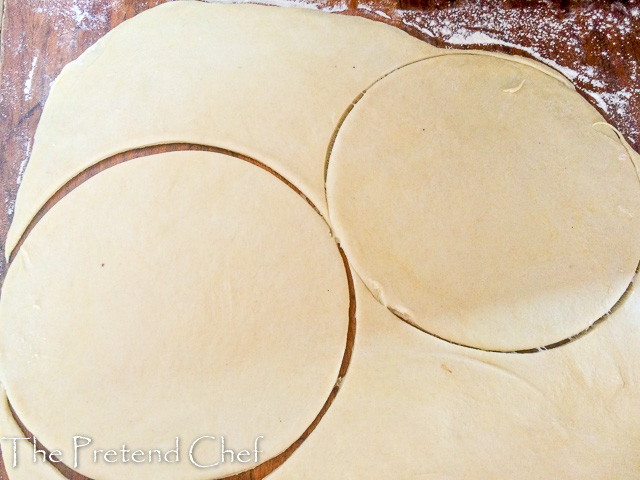
Place meat and vegetables in the middle of the pastry, leaving enough space around for sealing.
Place a small knob of butter on top of the filling if you used lean or not well-marbled meat.
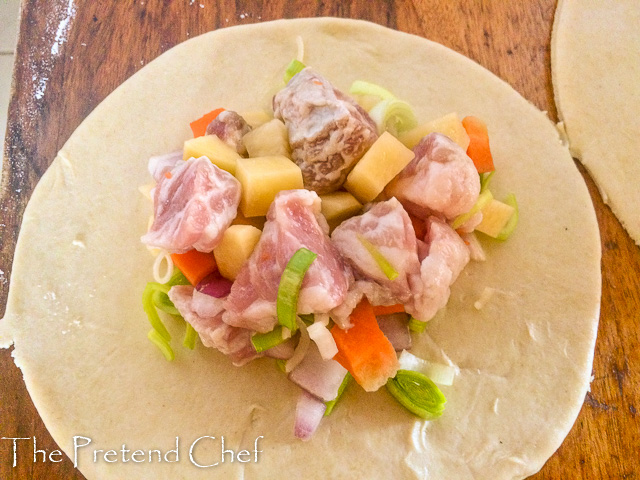
Bring the two sides of the dough together in the middle and crimp them to seal well.
You can also, put your filling on one side of the dough.
Bring the empty side over the filling to cover it, crimp the edges together.
Place on lined baking sheets.
Beat egg with 1 teaspoon of water or milk, glaze the pasties.
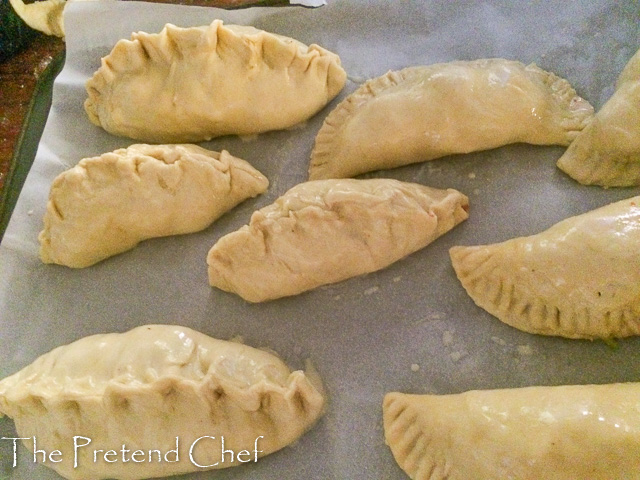
Bake at 180 deg. C for 50-60 minutes until golden.
Serve your Nigerian Cornish Pasty with tea and a green salad or coleslaw or Zobo and a drizzle of ketchup or any drink of your choice.
Notes
- If you are using a lean cut of beef, add a knob of butter into your pasty filling before wrapping. If using Tozo or any well-marbled cut of meat, you won’t need the addition of that extra knob of butter.
- Marbled meat is meat that has a good network of fat.
- You can sprinkle a little flour over the filling to thicken the gravy.
- Be a little generous with the salt and pepper.
- Don’t skimp on the rest time for the dough, that gluten you worked up need to rest and relax for easy rolling. If you are rolling and the dough keeps bouncing back, shrinking or tearing then it has not rested enough.
- According to the Western Morning News, food historian Peter Brears has this to say about Cornish Pasty originating from Cornwall, “Always containing red meat, its use was spread throughout the entire country by London-trained cookery teachers who invented the term ‘Cornish pasty'” and that originally, Cornwall created vegetable only filled pasties. (I didn’t have to include this!)
What other ingredients will you add to your Nigerian Cornish Pasty filling?
You will also enjoy my Nigerian meat pie, Nigerian fish pie, Nigerian chicken pie, Nigeria sausage roll, Easy Apple Hand Pie and Nigerian Vegetable Pie.
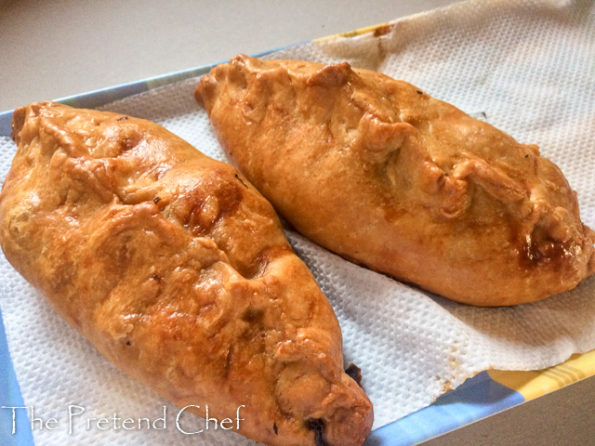
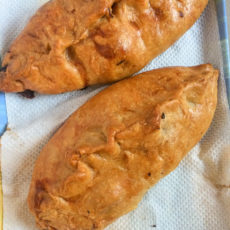
Nigerian Cornish Pasty
Ingredients
Dough
- 2 cups flour
- ½ teaspoon salt
- ⅓ cup margarine
- ½ cup + 3 tablespoons ice cold water
Filling
- 250 g Beef (cut into cubes)
- 250 g potato (diced)
- 125 g carrot (diced)
- 50 g onions (diced or sliced)
- 75 g leek (sliced)
- salt
- Pepper
- Egg or milk for glazing.
Instructions
- Place flour in a large bowl, add salt and mix.
- Cut cold margarine into the flour.
- Rub in the margarine with your fingers, fork, knife or pastry cutter, until the mixture resembles large breadcrumbs.
- Add 1 cup cold water and knead, adding the rest of the water as needed.
- Knead to form a soft, smooth, pliable and elastic dough. (A food mixer can also be used.)
- Flatten dough to form a disc and put in a plastic wrap, this helps it chill faster.
- Put in the refrigerator to chill and relax for three hours or more.
- Allow dough to warm up a bit before rolling. If frozen, defrost in the refrigerator possibly overnight.
- Meanwhile, prepare the pasty filling and set aside.
- To roll dough: Press dough lightly with the rolling pin at the centre and roll outwards.
- Roll in one direction a couple of times then lift it up and rotate a quarter turn and roll. Keep rolling and rotating till you get your desired thickness. Be patient and take your time. If the dough is getting sticky, lift it up, sprinkle flour on the countertop, the rolling pin and lightly on top of the dough.
- Cut into 8-inch circles using a small plate or whatever is available.
- Place meat and vegetables in the middle of the pastry, leaving enough space around for sealing. (Place a small knob of butter on top of the filling if you used lean or not well-marbled meat.)
- Bring the two sides of the dough together in the middle and crimp them to seal well. (You can also, put your filling on one side of the dough.)
- Bring the empty side over the filling to cover it, crimp the edges together.
- Place on lined baking sheets.
- Beat egg with 1 teaspoon of water or milk, glaze the pasties.
- Bake at 180 deg. C for 50-60 minutes until golden.
- Serve your Nigerian Cornish Pasty with tea and a green salad or coleslaw or Zobo and a drizzle of ketchup or any drink of your choice.
Notes
- If you are using a lean cut of beef, add a knob of butter into your pasty filling before wrapping. If using Tozo or any well-marbled cut of meat, you won't need the addition of that extra knob of butter.
- Marbled meat is meat that has a good network of fat.
- You can sprinkle a little flour over the filling to thicken the gravy.
- Be a little generous with the salt and pepper.
- Don't skimp on the rest time for the dough, that gluten you worked up need to rest and relax for easy rolling.
- If you are rolling and the dough keeps bouncing back, shrinking or tearing then it has not rested enough.
- According to the Western Morning News, food historian Peter Brears has this to say about Cornish Pasty originating from Cornwall, "Always containing red meat, its use was spread throughout the entire country by London-trained cookery teachers who invented the term 'Cornish pasty'" and that originally, Cornwall created vegetable only filled pasties. (I didn't have to include this!)
Do you have any comments, questions or suggestions, please leave a comment below.
Share this recipe using the share buttons.
Subscribe to the blog for instant notifications of new recipes.
Follow on Instagram: @thepretendchefofficial, Twitter: @thepretendchef Facebook: https://web.facebook.com/thepretendchef/, Pinterest: https://www.pinterest.com/thepretendchef/
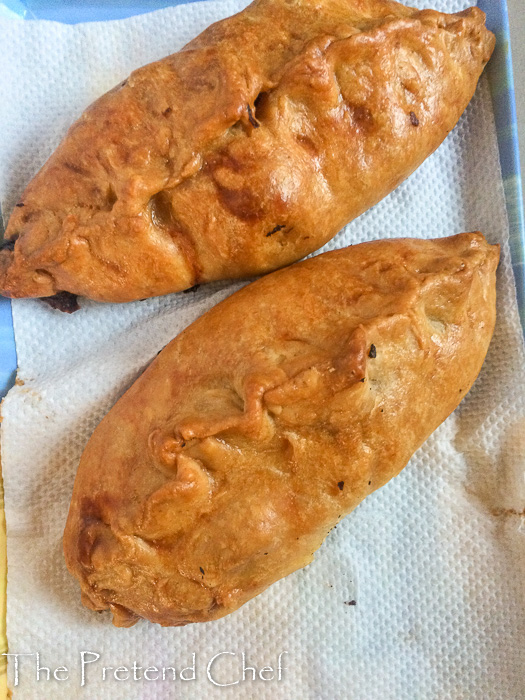
 I am Ganiru, a wife, a mother, a food blogger, a chef, an author and an accountant. I love to cook and write about food, especially Nigerian and afro-centric food...
I am Ganiru, a wife, a mother, a food blogger, a chef, an author and an accountant. I love to cook and write about food, especially Nigerian and afro-centric food...
Pingback: Nigerian Sausage Roll - The Pretend Chef
Pingback: Easy Pie Dough, shortcrust pastry - The Pretend Chef